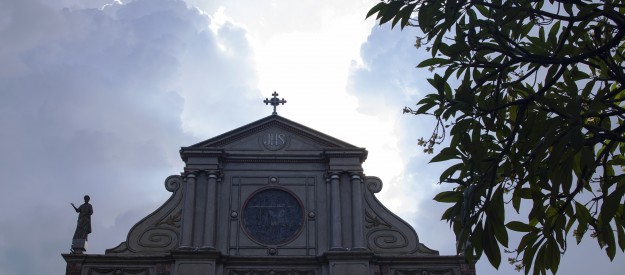"We are losing our attitude of wonder, of contemplation, of listening to creation and thus we no longer manage to interpret within it what Benedict XVI calls 'the rhythm of the love-story between God and man.'"
+ Pope Francis
Clearing the air

It’s been a long-standing tradition within the Church to not do business with those that knowingly harm others. In the twenty-first century, that means divesting from companies that profit from fossil fuel extraction—the byproducts of which we know are a major cause of global warming.
Following a smaller announcement in 2017 of Catholic institutions divesting from the fossil-fuel business, the Global Catholic Climate Movement announced this week that an impressive thirty-five more institutions have followed suit.
Long championed by ecclesial voices that you’d expect to take such action, this latest wave comes with some big names. One of those is Caritas Internationalis, the umbrella organization of some 160 Catholic charities. Lead by His Eminence Cardinal Luis Tagle of the Archdiocese of Manila, the organization knows firsthand the impacts of stronger storms, sea-level rise, drought, and other impacts of a warming globe.
The list, in total, is impressive. And there are divesting resources available for anyone in a position of influencing organizational finances.
The dent all this makes in the global fossil fuel industry may not be noticed in anyone's financial ledgers, although one divesting group is Pax-Bank, a Catholic banking institution holding over $9 billion.
Still, the financial impact isn't really the point.
What the divesting institutions have done is shine a light on both a concern and a possibility.
The concern is remaining attached to an industry that cannot continue for long within a sustainable, cleaner world. The possibility is the moral choice of nudging the financial markets, and perception, closer to smarter, more human- and planet-friendly sources of energy, like wind and solar.
Of course, this nudging can come with drawbacks. One involves our brothers and sisters whose jobs in the fossil fuel industry allow them to feed their families. As we celebrate the news of Catholic divestment, we must be careful to respect the futures and the dignity of those people. Fortunately, groups like the Catholic Climate Covenant are embracing the matter of a “just transition” to renewable industries. There’s also been a great deal of thought on how Catholic principals can best be applied to the sticky economic and social questions around energy. And more of this work is continuing within ecclesial and academic structures.
In all this work, the bottom line remains a Catholic one: offering the voice of the Church to guide this world-altering endeavor of fossil-fuel transitioning. Because if the world is going to change—and change it will—it’s best that those changes happen with the Gospel being proclaimed and the grace of God offered. That way, the choices we make stand a better chance of being for the good of all, now and in the future.


















